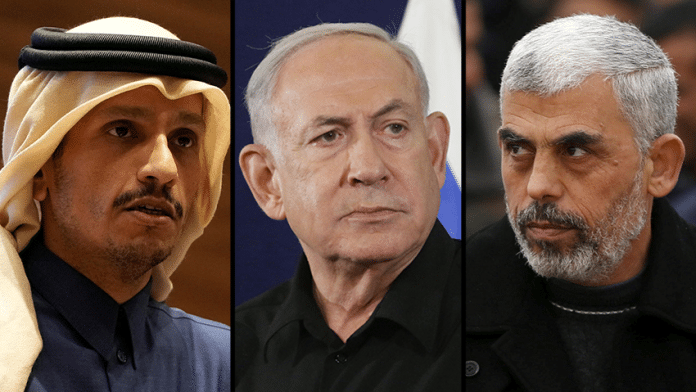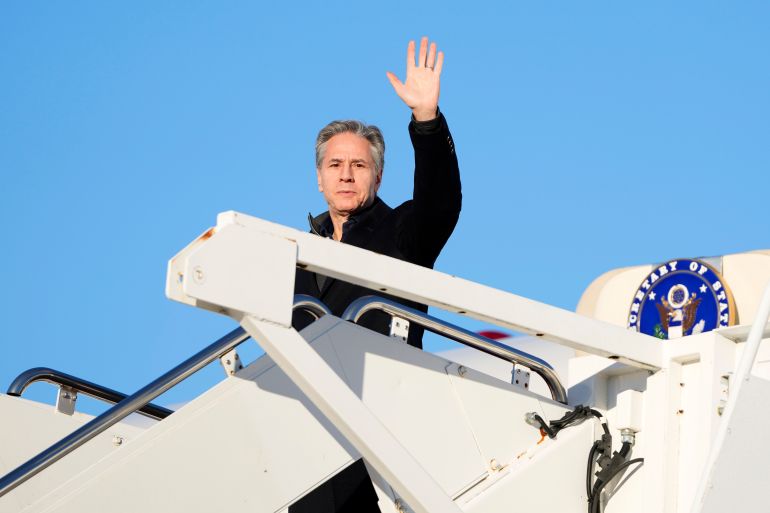Israel’s government spokesman said Israel was studying the offer intently, with Prime Minister Benjamin Netanyahu due to hold a news conference later on Wednesday.
Israel’s Channel 13 TV quoted an unidentified official as saying some aspects were not acceptable and officials were debating whether to reject the proposal or seek modifications.
The Hamas offer, the contents of which were first reported by Reuters, is a response to an earlier proposal drawn up by US and Israeli spy chiefs and delivered to Hamas last week by Qatari and Egyptian mediators.
US Secretary of State Antony Blinken discussed the offer with Netanyahu after arriving in Israel following talks with the leaders of Qatar and Egypt, the countries that have acted as mediators in the conflict.
There remain major gaps between the two sides: Israel has previously said it will not pull its troops out of Gaza or end the war until Hamas is wiped out. But sources described Hamas as taking a new approach to its longstanding demand to end the war, now proposing this as an issue to be resolved in future talks rather than a pre-condition for the truce.
A source close to the negotiations said the Hamas counterproposal did not require a guarantee of a permanent ceasefire at the outset, but that an end to the war would have to be agreed before final hostages were freed.
A second source said Hamas still wanted guarantees from Qatar, Egypt and other friendly states that the ceasefire would be upheld and not collapse as soon as hostages go free.
“They want the aggression to stop and not temporarily, not where (the Israelis) take the hostages and then the Palestinian people live in a grinder.”
Israeli government spokesperson Avi Hyman told reporters: “We have received an update, we have received notification from the Qatari negotiators. We are looking at them. The Mossad is looking intently at what was presented to us.”
Ezzat El-Reshiq, a member of the Hamas political bureau, said the group’s aim was “to stop the aggression against our Palestinian people and secure a complete and lasting ceasefire as well as provide relief, aid, shelter and reconstruction.”
According to the offer document seen by Reuters and confirmed by sources, during the first 45-day phase all Israeli women hostages, males under 19 and the elderly and sick would be released, in exchange for Palestinian women and children held in Israeli jails. Israel would withdraw troops from Gaza’s populated areas.
Implementation of the second phase would not begin until the sides conclude “indirect talks over the requirements needed to end the mutual military operations and return to complete calm”.
The second phase would include the release of remaining male hostages and full Israeli withdrawal from all of Gaza. The remains of the dead would be exchanged during the third phase.
“People are optimistic, at the same time they pray that this hope turns into a real agreement that will end the war,” Yamen Hamad, a father of four sheltering in a U.N. school in Deir Al-Balah in the central Gaza Strip told Reuters via a messaging app.
In Rafah, on the southern edge of the Gaza Strip where half of the enclave’s 2.3 million people are penned against the border fence with Egypt, the bodies of 10 people killed by Israeli strikes overnight were laid out in a hospital morgue. At least two of the shrouded bundles were the size of small children. Relatives wept beside the dead.
“Every visit from Blinken, instead of calming things down, it just makes things worse, we get more strikes, we get more bombing,” said mourner Mohammad Abundi.
Israel began its military offensive after militants from Hamas-ruled Gaza killed 1,200 people and took 253 hostages in southern Israel on October 7 Gaza’s Health Ministry says at least 27,585 Palestinians have been confirmed killed, with thousands more feared buried under rubble. There has been only one truce so far, lasting just a week at the end of November.
Netanyahu is under competing pressure from far-right members of his coalition government who say they will quit rather than endorse any deal that fails to eradicate Hamas, and from families of hostages who demand a deal to bring them home.
Washington has cast the hostage and truce deal as part of plans for a wider resolution of the Middle East conflict, ultimately leading to reconciliation between Israel and Arab neighbours and the creation of a Palestinian state.
Netanyahu has rejected a Palestinian state, which Saudi Arabia, the biggest prize in Israel’s quest for acceptance from Middle East neighbours, says is a requirement for any deal to normalise relations with Israel.
The diplomatic push comes amidst intense combat in Gaza, with Israel pushing to capture the main city in the south of the enclave, Khan Younis, and fighting also resurging in northern areas Israel claimed to have subdued months ago.
Last week, Israel said it plans to storm Rafah, raising alarm among international aid organisations who say an assault on the last refuge at Gaza’s edge would cause a humanitarian catastrophe for more than a million displaced people.
The Israeli military said it had killed dozens of militants in fighting over the past 24 hours. It has made similar claims throughout the fighting in Khan Younis, which could not be independently verified.














